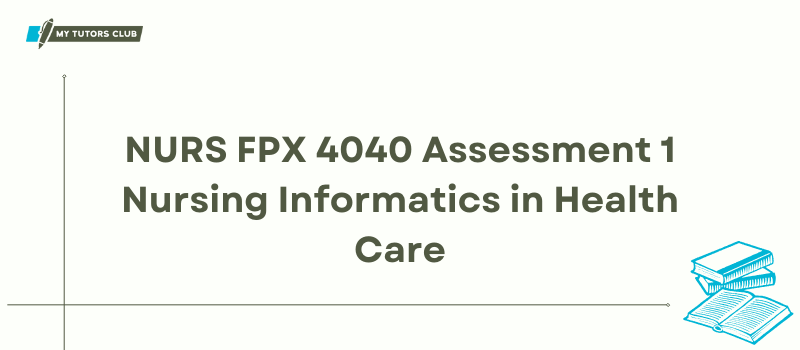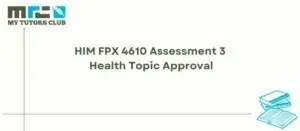Nursing is a constantly changing field which is always evolving. The field of technology is an evolving field that may be integrated into the field of health for better treatment of patients. NURS FPX 4040 Assessment 1 Nursing Informatics in Health Care is among the areas of nursing. Nursing informaticists comprise nurses who have completed training in nursing information technology. In this piece, we will examine nurses ‘ work as informatics experts and what they do within the organization to provide health care. This article will look at the significance of nurses’ informatics in healthcare. It will discuss the benefits and drawbacks.
Nursing Informatics and the Nurse Informaticist
In 1992, the American Nurses Association recognized nursing informatics as a subject of study within the field of nursing (Chauvette, 2016). Nursing informatics is described in different ways, and the language used to describe this field has been modified over time.
Nursing informatics is a field that integrates nursing science and various analytical and information sciences (a list of disciplines that connect with NI include cognitive science, computer science, the study of taxonomies and terminologies [including the naming and coding information management libraries, heuristics, mathematicians and archival science”) to recognize and define, control and transmit information, data and knowledge in nursing practice. NURS FPX 4040 Assessment 1 Nursing Informatics in Health Care work in nurse informatics. They could perform a variety of tasks. Many of them involve utilizing processes and technological data for patients, nurses, healthcare professionals, and other stakeholders to ensure the best quality results (Bickford, 2015).
Nurse Informaticists and Other Health Care Organizations
They will put their expertise into clinical practices while cooperating with the medical team to identify how technological advancements in healthcare will help provide safe and secure care to people (Mook 2016.). Informaticists for nurses review patient information and work with tech experts in designing the required software (Mook 2016.). If there are issues regarding technology or, if required, nurses can assist in making necessary adjustments through the interdisciplinary group of tech experts. If medical professionals decide that hospitalizations should be rescheduled, Informaticists from nurses can aid in developing an e-health program that monitors the patient’s health following discharge.
Impact of Full Nurse Engagement in Health Care Technology
Nurses’ involvement in using medical technology is beneficial in various ways. This includes data on patients’ health and workflows to ensure medical treatment and cost. Telemedicine makes healthcare more accessible to patients who do not have access to it. Telemedicine allows patients to access preventative medical services and critical surveillance, improving overall health and sufferers’ quality of life (Rauv, 2017).
Utilizing technology in healthcare can reduce the length of hospital stays and adverse occasions while also increasing patients’ happiness (Rauv 2017/2017). Patients can check their health by using smartphone apps. Users can log in at any time during the day to review laboratory results, set appointments for prescription refills, or even call their doctor (Rauv 2017. and 17. ).
Medical records that are stored electronically provide security, confidentiality, and privacy in accordance with HIPAA. Employees can gain access to the specific information in the medical record. Other information is secured. The medical records that are electronically are also a reliable method to Transfer data safely to doctors and healthcare health providers. Electronic health records can be stored to preserve patients’ information in a central database that allows dentists, specialists, doctors, and practitioners to access every medical history that a patient can access (Rauv and Co. 2017/2017. ). Utilizing electronic medical records and using barcode technology in the administration of drugs can be efficient as it reduces the risk of making mistakes (Truitt and Co. 2016. ).
NURS FPX 4040 Assessment 1 Nursing Informatics in Health Care
Staff members of nursing who are working in health technology could affect the workflow of their work. The tools for health technology are electronic prescription, electronic health records, and telemedicine, which aid collaboration among multidisciplinary teams. Each team member is required to access diagnostic tests and other information quickly, allowing for better patient treatment, better decisions, and improved results. Physicians may use videoconferencing during sessions or talk about recent developments within a region (Rauv 2017. ).
The role of nursing in health technology developments is a significant investment that is sure to bring more. As a result of the Affordable Care Act, hospitals will be reimbursed according to the level of care they provide. Hospitalization rates and outcomes for patients, along with the length of hospital stay and satisfaction levels with patients, are among the factors used in determining the level of care hospitals can deliver. Higher patient satisfaction, lower incidences of adverse events, shorter hospital stays, and fewer hospitalizations could be due to the use of technology in medical care (Hessels and colleagues. 2015. ).). Therefore, NURS FPX 4040 Assessment 1 Nursing Informatics in Health Care may increase the amount of reimbursement to hospitals, which is in line with the guidelines outlined in the Affordable Health Care Act. (Hessels et al. (2015)).
Opportunities and Challenges
An entry point to the team’s multidisciplinary structure may pose problems but also present potential opportunities. Team members’ views of technology could differ from person to person. Nurse informaticists must ensure that everyone within the team receives appropriate education to utilize the latest techniques in the field of health care effectively. The nurse informaticist is responsible for ensuring that the entire team is within the guidelines of all participants. They must also offer support and training when required.
There are numerous options for companies that employ nurses who are also informaticists. One of the most evident is more effective collaboration between teams of diverse disciplines, which can improve patient results. Informaticist nurses design and implement tools like electronic medical records and barcodes to aid in telehealth, medicine administration and apps for mobile health. Interprofessional teams collaborate with nurses and informaticists using these tools.
Conclusion
NURS FPX 4040 Assessment 1 Nursing Informatics in Health Care can benefit any company by providing high-quality health care to patients. Informaticists in nursing employ technologies and methods to improve efficiency, precision, and healthcare safety. The results have been shown to reduce the incidence of adverse incidents, improve working environments, decrease the duration of hospitalization, and increase the levels of satisfaction among patients (Hessels and co. (2015)). The new reimbursement guidelines comply with the Affordable Health Insurance Act (Hessels & Co., 2015). Technology is a crucial aspect of healthcare, so nurses must employ an informaticist to ensure that healthcare establishments can avail themselves of all the options they can offer their clients.
References
Bickford, C. J. (2015). The specialty of nursing informatics: New scope and standards guide practice. Computers, Informatics, Nursing : CIN, 33(4), 129. Retrieved from https://oce- ovid-com.library.capella.edu/article/00024665-201504000-00001/HTML
Chauvette, A. (2016). History of nursing informatics in canada. Canadian Journal of Nursing Informatics, 11(4) Retrieved from http://library.capella.edu/login?qurl=https%3A%2F%2 Fsearch.proquest.com%2Fdocview%2F1884547690%3Faccountid%3D27965
Hessels, A., Flynn, L., Cimiotti, J. P., & Bakken, S. (2015). Impact of heath information technology on the quality of patient care. Online Journal of Nursing Informatics, 19(3). Retrieved from: https://www.himss.org/impact-heath-information-technology-quality- patient-care
Mook, P. (2016). Informatics Nurses – Advocates for Nurses and Patient Safety. Retrieved from https://www.himss.org/news/informatics-nurses-advocates-nurses-and-patient-safety
Rauv, S. (2017). The Impact of Technology in Healthcare. Retrieved from https://www.elcom.com.au/resources/blog/the-impact-of-technology-in-healthcare-trends- benefits-examples
Truitt, E., Thompson, R., Blazey-Martin, D., Nisai, D., & Salem, D. (2016). Effect of the implementation of barcode technology and an electronic medication administration record on adverse drug events. Hospital Pharmacy, 51(6), 474-483. doi:10.1310/hpj5106-474




